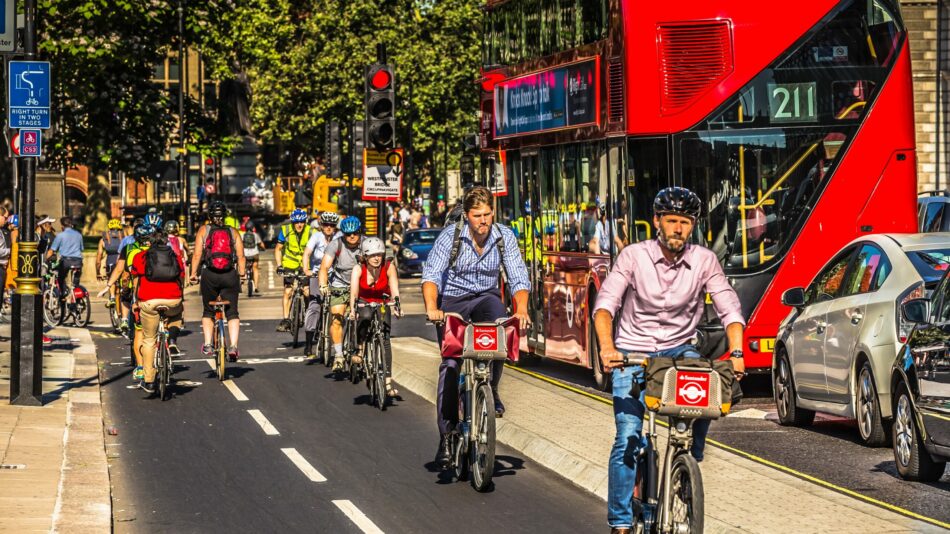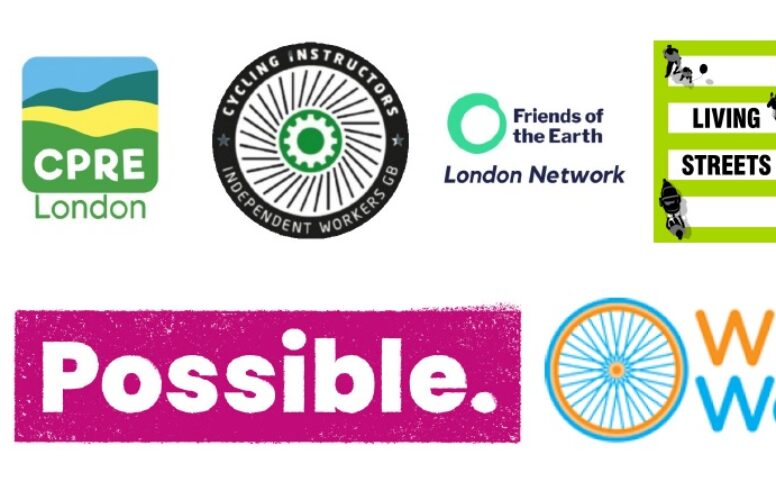

LCC has joined with eight other organisations during COP26, Centre for London, CPRE London, IWGB Cycling Instructuctors Branch, Friends of the Earth London Network, Future Transport London, Living Streets, Possible and Wheels for Wellbeing, to ask government to take urgent action to enable London to move forwards faster on climate change.

As organisations, we’ve highlighted the way the government is currently funding TfL in short, six month settlements as having a major impact on the way the Mayor of London, TfL and London boroughs can act on pressing climate issues. London must accelerate action on climate if we are to play our part as a capital city in leading the country, and cutting emissions fast, and the Mayor, Sadiq Khan, has pledged to make London carbon neutral by 2030. He will fail on that mission if he is not funded properly by government – as will the government fail on the recommendatons from its Climate Change Committee.
We can see the impact of short-term and low levels of funding on action on climate already in London: a lack of delivery of larger walking, cycling and wheeling schemes; an inability to deal with the most difficult and dangerous parts of most schemes, junctions; an inability to design schemes to maximise inclusion; cuts to public transport, with more inbound; cuts to cycle training. All of these add further barriers to enabling Londoners to shift from cars to more sustainable modes. So in the light of COP26, we need the government to act, and act now.
The letter is readable as a PDF here. And its text is reproduced in full below.
Dear Rt Hon Alok Sharma, President of COP26 & Rt Hon Grant Shapps, Secretary of State for Transport,
We welcome the publication of the Government’s new plan for achieving a net zero carbon UK. However, as the Climate Change Committee (CCC) has said, even this new set of policies will not deliver the level of carbon reduction required in law in the sixth carbon budget under the Climate Change Act (i.e. a 78% reduction compared to 1990 levels by 2035). Faster and deeper cuts in emissions will be needed.
In London that means investing more in measures that enable a dramatic mode shift away from cars and towards more walking, wheeling and cycling, and public transport – even the most optimistic projections for electric vehicle supply and uptake show that relying on EVs alone will be insufficient to make these faster, deeper cuts.
London has already shown what is possible to support people to choose to walk, wheel and cycle (active travel), and has one of the most successful public transport systems in the world. It has the capability to lead the way for England as a whole, as it did during Boris Johnson’s time as Mayor, by accelerating provision for safe cycling, wheeling and walking, and has a strong base from which to expand public transport. Indeed the DfT has taken a proactive, positive approach to widening access to safe cycling infrastructure and increasing walking during the pandemic, through its recent funding programmes.
However, the required acceleration in provision for active travel and increased public transport cannot happen without adequate and sustained funding. The funding secured by DfT for active travel for three years outside of London will have a transformational effect. In contrast, DfT is only funding TfL in six month tranches. This approach is clearly having a disastrous effect on TfL and London boroughs’ ability to plan and deliver the level of mode shift away from private cars needed to decarbonise London’s roads in line with the sixth carbon budget.
Negative impacts of the current funding situation include:
- All larger cycling and transport infrastructure projects that cannot be delivered within 6 months from start to finish are on hold. TfL and the boroughs have no ability to forward plan as a result.
- Recent emergency walking, wheeling and cycling schemes have often failed to be as inclusive as they should be. Short term funding has clearly made designing out or removing accessibility flaws less achievable. This limits the huge potential that exists for modal shift by Disabled people and all potential cargo cycle users (families & the logistics trade). It also limits these schemes’ effectiveness in reducing emissions.
- TfL are already being forced to make cuts to bus services, with further cuts on the cards if the current funding situation doesn’t stabilise.
- Safe junction designs (as mandated in DfT’s LTN 1/20 guidance) are proving largely impossible to deliver in temporary and trial schemes; yet junctions are where most collisions and fatalities to those walking and cycling arise – and therefore dangerous junctions remain one of the biggest barriers to mode shift in London.
- TfL has cut back significantly on funding cycling training for children and adults. In the DfT’s “Gear Change – one year on” document it was stated that: “The Government has a manifesto commitment to offer Bikeability training to every school child.” The Prime Minister announced “this commitment would extend to any adult that wanted cycle training.” But that no longer holds in many London boroughs. And this at a time when temporary schemes rolled out during the crisis, funded by the DfT, appear to be triggering a substantial mode shift, demonstrating the great potential for cycling in London, including among school pupils.
We have a rapidly shrinking window to act on the climate crisis. The UK is hosting the critical COP26 meeting in Glasgow, and takes on the year-long presidency of the COP. This brings an enormous weight of responsibility to show international leadership through domestic action.
We urge you to ensure that London is given a proper and sufficient funding settlement, including the ability to retain and raise funds within London, to support decarbonising what is the largest transport system of any city in Europe. Unless that happens, London’s ability to meet the decarbonisation targets you have rightly set is at serious risk, and therefore so too is that of the whole of the UK.
Yours,
Simon Munk, Campaigns Manager, London Cycling Campaign
Isabelle Clement, Director, Wheels for Wellbeing
Stephen Edwards, Interim CEO, Living Streets
Quentin Given, Lead Organiser, Friends of the Earth London Network
Michael McSherry, Chair, IWGB Cycling Instructors Branch
Leo Murray, Co-director, Possible
Alice Roberts, Head of Campaigns, CPRE London
Neil Roth, Honorary Secretary, Future Transport London
Rob Whitehead, Director of Strategic Projects, Centre For London